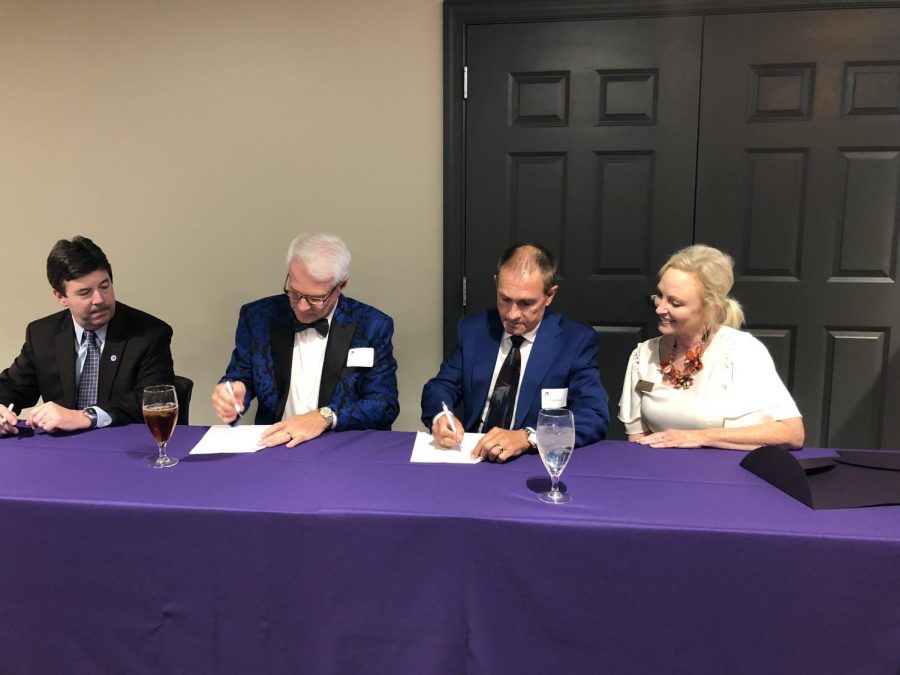Inclusion center will provide support for LGBT students
October 19, 2018
Elliot Mitchell and Clark West have pledged $250,000 to build the Center of Social Inclusion on campus. Earlier this year, the couple created a scholarship in honor of Patti Sue Mathis who died by suicide because she did not feel accepted after coming out as gay.
University President Kenneth Kitts said at an event to honor the couple Oct. 9 he wants to make sure the words “diversity” and “inclusion” are more than just a bumper sticker to UNA.
“Elliot and Clark have passion for inclusion and are committed to that call,” Kitts said.
Vice President for Advancement Deborah Shaw said the center is transformational for the university and it is going to make a difference.
“We will become known for this nationally,” Shaw said. “Just you watch.”
Mitchell and West graduated from the University of Alabama. West said he and Mitchell were not embraced by the university.
“We were told to go where we are wanted, and you guys want us,” West said.
West, who grew up in Dothan, said he was touched by the story of Patti Sue.
“It is absolutely, positively unacceptable for anyone to feel like they have to take their lives for who they are and who they love,” West said.
He said he knew from an early age things were different and he did not have a choice in it. He and Mitchell lived very private and quiet lives.
“I was tired of having family members coming to visit and having to put pictures up,” West said.
Mitchell said he changed jobs every two years for the first 20 years of his career because he would get fired if they discovered his sexual orientation.
“So many young people do not have opportunities or advantages,” Mitchell said. “I hope this center is a beacon to young people in the state of Alabama and they will see there is an opportunity to get an education and live a normal life. The center is about embracing our differences.”
Mitchell’s niece and her husband attended the event. He began to get emotional as he explained this was the first event any of his family had attended because of his relationship with West.
Rebecca Lopez, the president and a co-founder of the Shoals Diversity Center, said the scholarship will provide possibilities otherwise only dreamed of by kids and the social inclusion center will provide a safe place that will let students know they are important and cared for and are a priority to the university.
Jonathan Rosales, program director at the Point Foundation, said it is a show of character that Mitchell and West named the scholarship after Patti Sue and not themselves out of recognition.
The Point Foundation is the nation’s largest scholarship organization for LGBTQ students in higher education and helped to create the Patti Sue Mathis scholarship.
The scholarship application opens Nov. 1 on the Point Foundation website and will be available until the end of January. The application will be open to undergraduate and graduate students.
Father of Patti Sue, Nathan Mathis, said if he can help just one pearl, it would all be worth it.
“Just don’t screw up like I did,” Mathis said. “My daughter, when she was gay, I showed my butt. I told her I was sorry and we patched things up. There’s no doubt in my mind. But one day, I had found my daughter and she had shot herself.”
Mathis said what happened to him could happen to anyone else.
“In the book of Acts, it talks about the Apostle Paul. His name was Saul,” Mathis said. “He persecuted Christians and he killed many Christians. He was there when they stoned Stephen to death and God forgave him. So you gay people, y’all forgive me and I believe God has forgiven me.”
Mathis said he believes people are born gay and relates it to eunuchs in the Bible.
“In Acts, it talks about a eunuch could be baptized. A eunuch is a castrated man. The Bible says some eunuchs are born eunuchs,” Mathis said, “Gay people are born gay. Autistic people are born gay. Down syndrome children are born gay. It’s time religious people need to realize that God loves gay people. Read the entire book of Acts. You’ll find the old law done away with. The new law came into existence and there was a lot of resistance from everywhere. Nowhere does it say a gay person can’t be a Christian.”


